




In Illinois, you do NOT need to show identification to vote after you have voted the first time, nor should election workers ask you for ID. You can vote on Election Day or early, and in-person or by mail. In addition, you can also request your ballot and election materials in a non-English language!

You have the right to vote in Illinois! You can cast a ballot if you are NOT currently serving a conviction inside a correctional institution or on temporary leave/furlough from prison!

Same Day Registration is available at all early voting sites and on Election Day. Voters must bring two forms of ID, with at least one that includes your current address.

Beginning February 15th, anyone can vote at the Chicago Board of Elections Supersite at 191 N. Clark. You can also vote in person from March 4th through March 19th at any of the 50 early voting locations in Chicago.

You can vote in person on Election Day at the precinct/polling location assigned based on your address or at the 50 early voting locations across the city.

Your application to Vote By Mail must be received by 5:00 pm on March 14, 2024. Once you receive your ballot, fill it out and then mail it in, or put it in an official drop-box.

As of 2020, Illinois allows you to drop your mail-in ballot at a secure drop-box outside of early voting and Election Day polling locations.

If you are eligible to vote, you should never be turned away from the polls. For questions or any issues at the polls, the Election Protection hotline provides free non-partisan voting assistance from legal advocates, call 1 (866) OUR-VOTE or 1 (866) 687-8683.
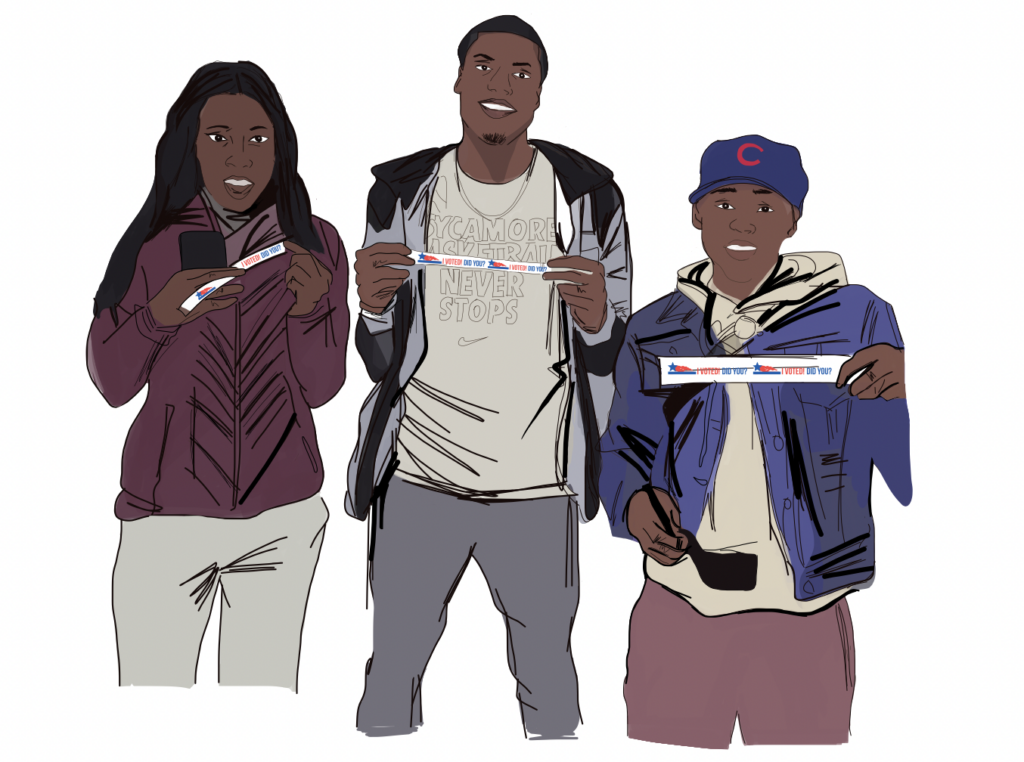
We determined the focus of this guide through conversations with young people on the power we have to impact the issues affecting us and our communities. We then collaborated with C.D. Everett to craft an informative story of something familiar and ordinary: a girl getting her hair done in a cozy home. With Chicago’s Real Estate Transfer Tax ballot measure, a home was intentionally chosen as the setting to illustrate the safety, dignity, and community that housing can foster. The State’s Attorney questionnaire was sent to all candidates. The answers in this guide are based on direct responses from candidates’ campaigns and direct quotes. Lastly, we worked with artists Luis Anaya and Ernesto Valle to create the Bring Chicago Home comic, to educate folks on the ballot measure’s details.
All three artists who contributed to this guide are incarcerated and unable to participate in the election. At Chicago Votes, we believe democracy works when more people are involved. To learn about our efforts to restore voting rights to people in prison, go to chicagovotes.com. Paid for by Chicago Votes Action Fund.
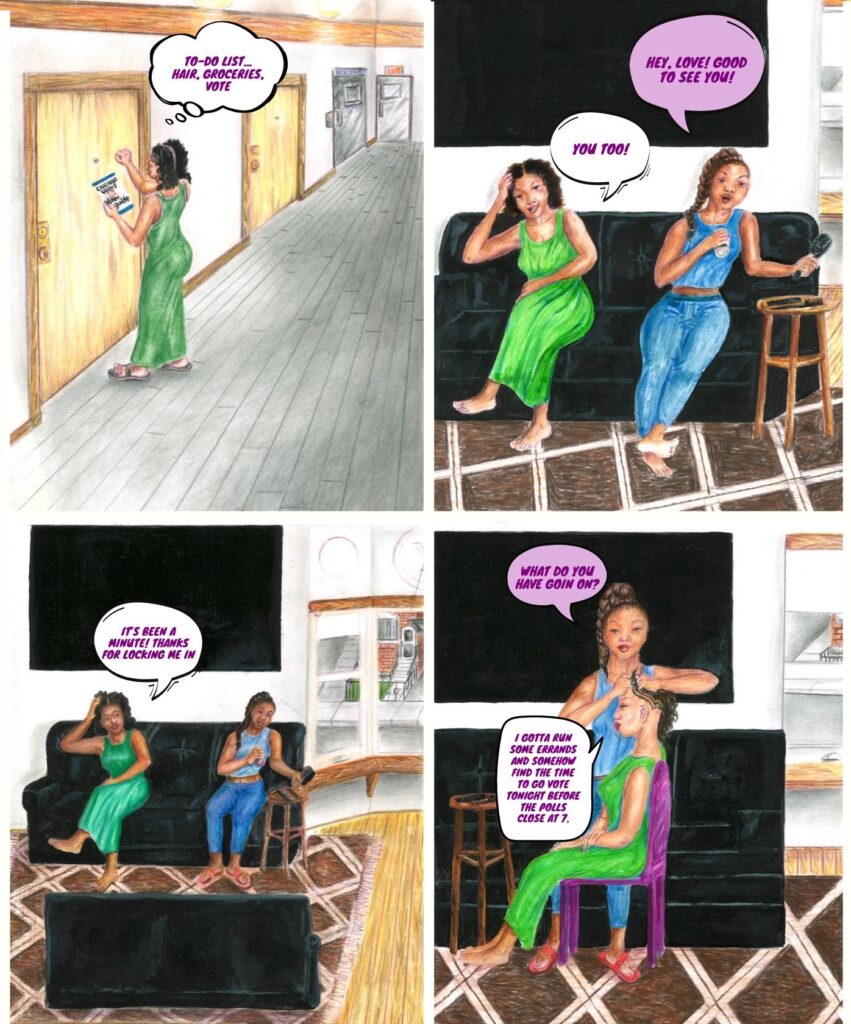

During the Illinois primary election, voters determine the candidates who will represent each political party in the November general election. In other words, voters narrow down the top candidates.
Illinois voters must select a political party affiliation to vote in that party’s primary. For example, if someone wants to help determine who the Republican Presidential Candidate will be, they would select a Republican ballot. Click here to view all the candidates on your ballot!

To Be Nominated:
- U.S. President
- U.S. Representative
- Illinois State Senator
- Illinois State Representative
- Illinois Supreme Court Judge
- Illinois Appellate Court Judge
- Circuit Court Judge
- Subcircuit Judge
- Cook County State’s Attorney
- Cook County Commissioner
- Cook County Clerk of the Circuit Court
- Water Reclamation District Commissioner
- Board of Review Commissioner
To Be Elected:
- Ward Committeeperson
- Delegates and Alternate Delegates to National Nominating Convention

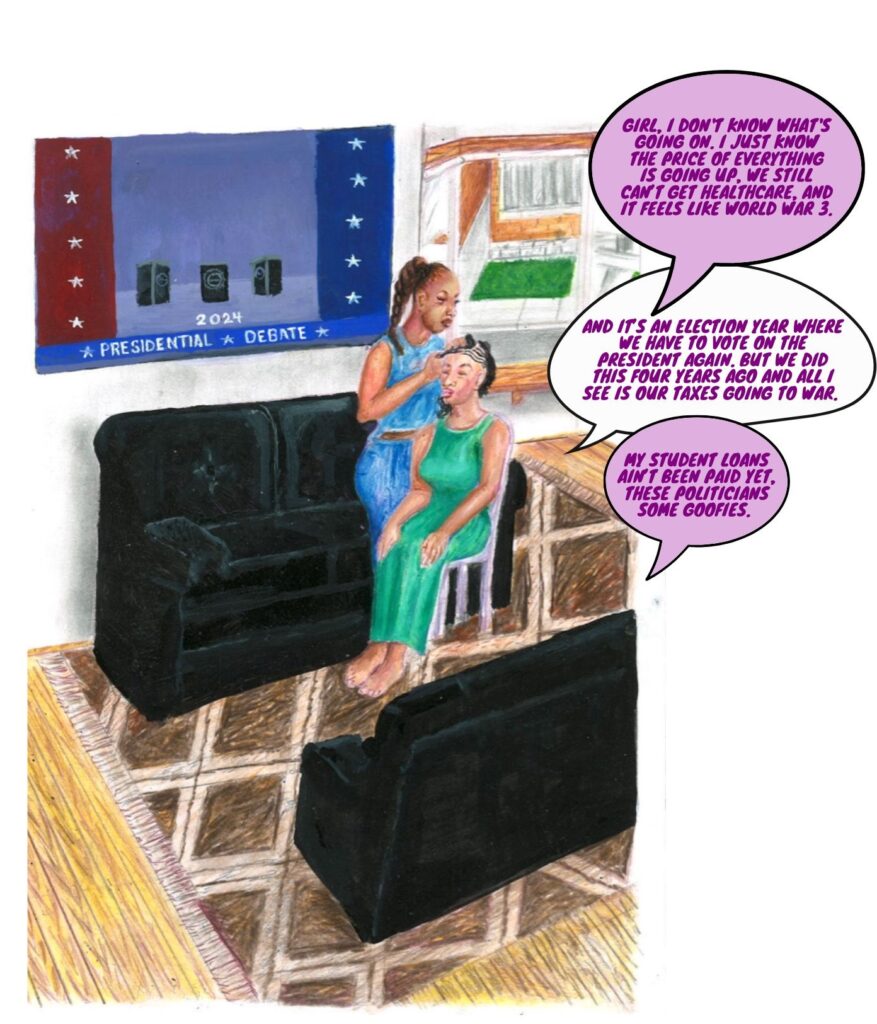
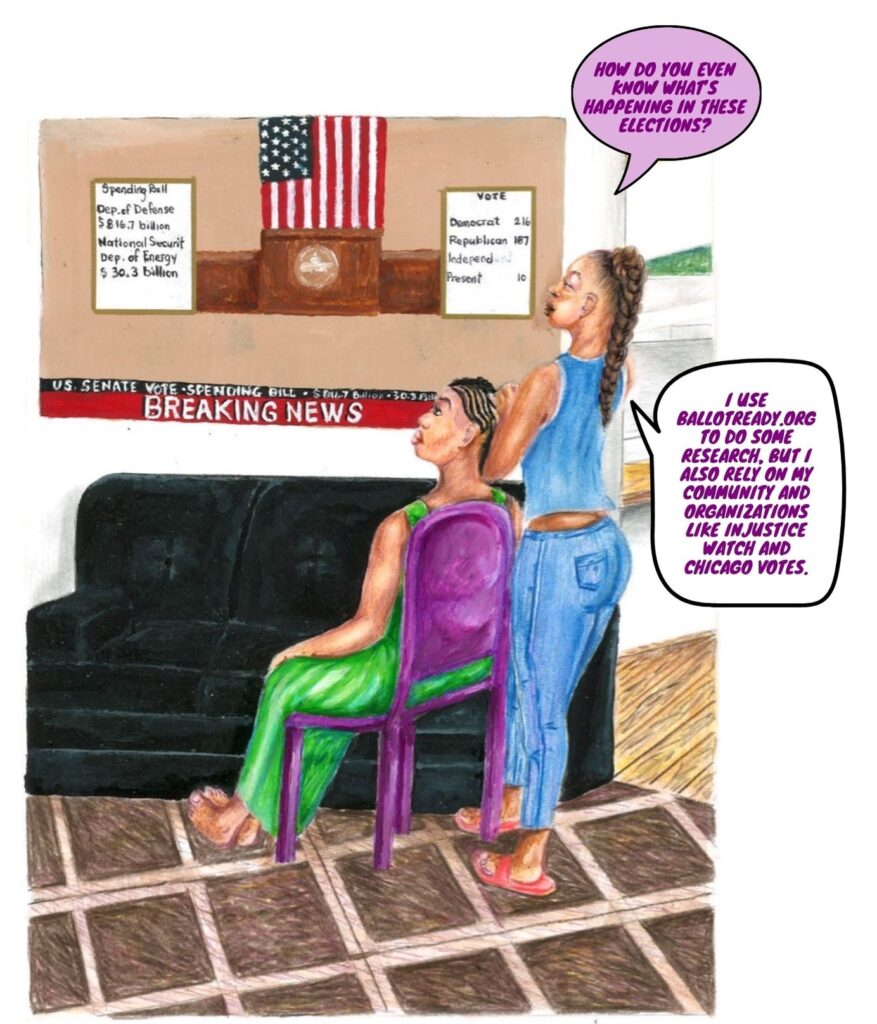
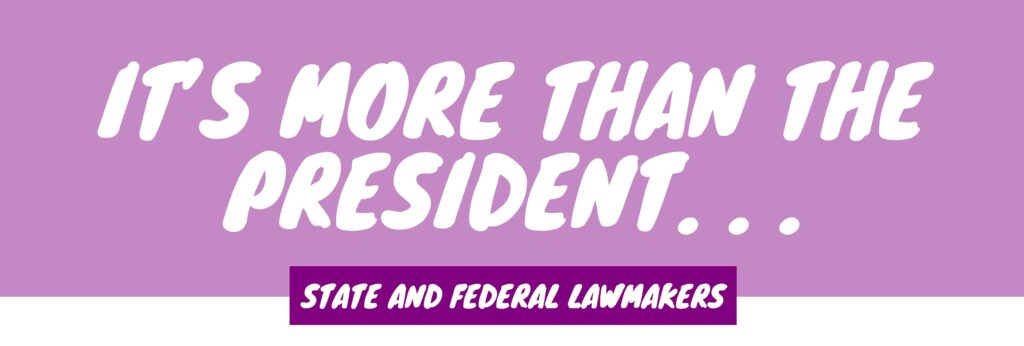
In 2024, we get to vote on the people who write and pass laws for the entire country and the state of Illinois–Senators and Representatives.
As young people, we continually express frustration over the lack of progress in issues like student loan debt, the rising cost of living, our environment, mass incarceration, and the ways our tax dollars are spent. State and Federal lawmakers are the ones who are elected to represent our interests. If lawmakers aren’t doing that, we can vote them out. We, as voters, can hold them accountable through elections.
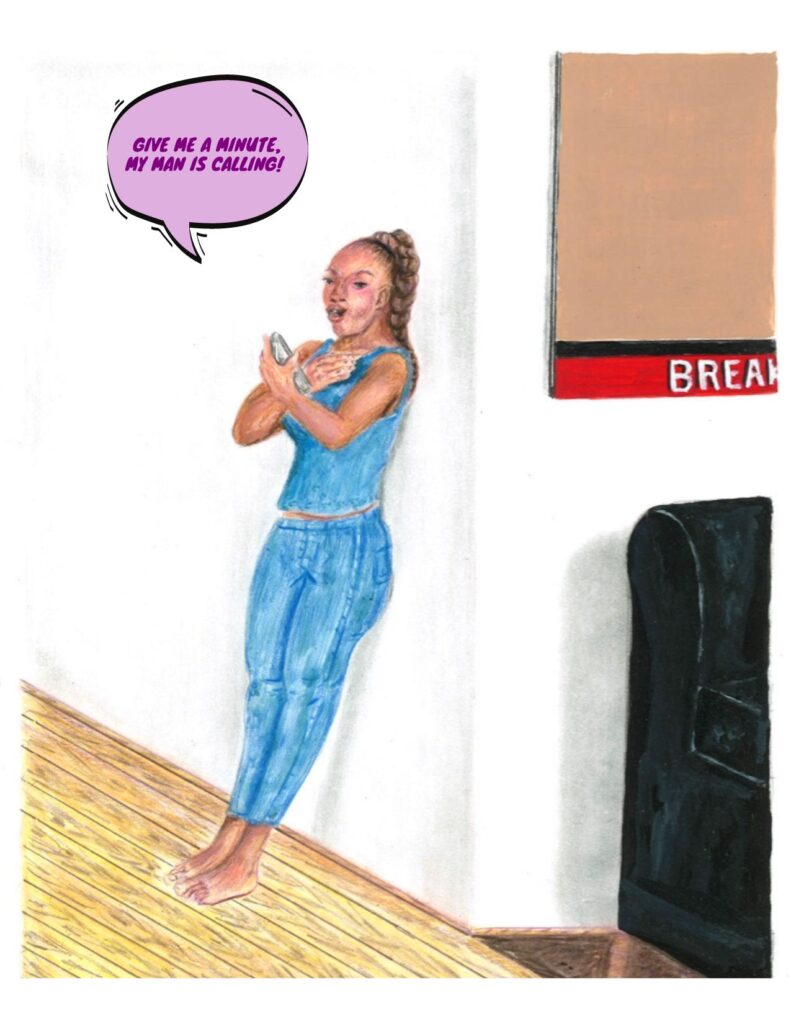
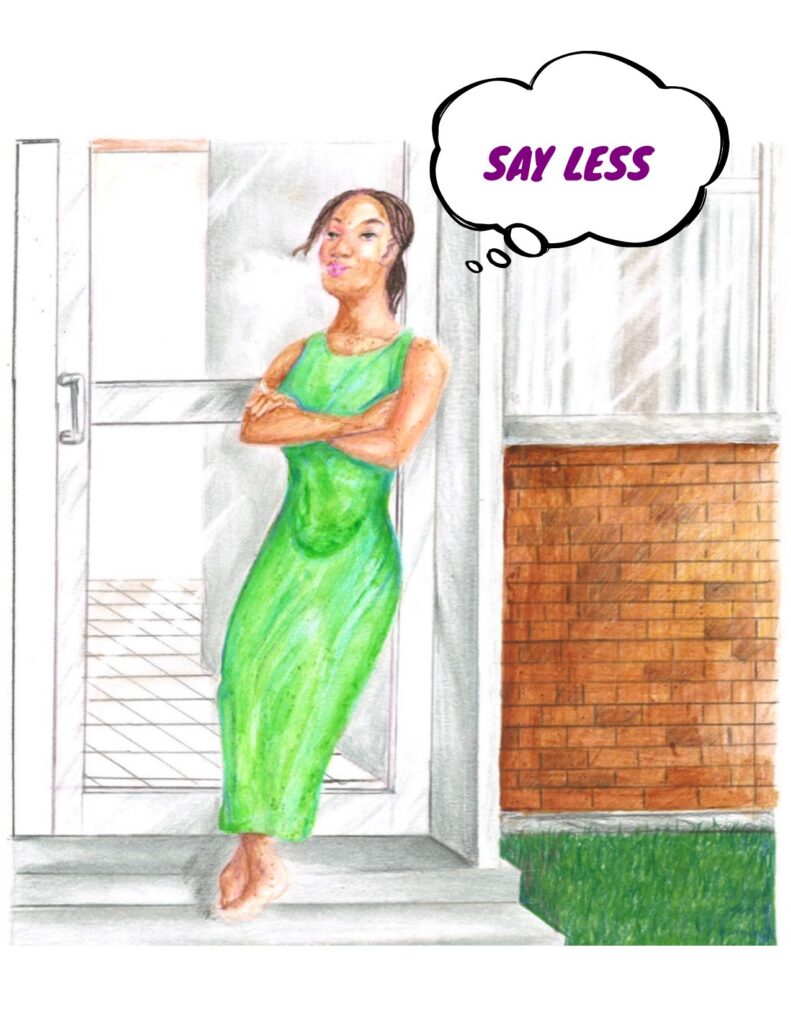

The Cook County State’s Attorney is the top prosecutor in the county, prosecuting violations of criminal laws and regulatory statutes, including child support, civil matters, domestic violence, fraud, and immigration services.
Illinois recently eliminated the use of money bonds as a condition of pretrial release. However, the State’s Attorney can still file a petition for detention based on danger posed to the community and the risk of flight.
Additionally, the office plays a crucial role in overseeing and investing in units like the Conviction Review Unit, actively working to rectify wrongful convictions based on allegations of misconduct or new evidence. According to the Sun-Times, this office has overturned more than 200 cases based on allegations of misconduct or new evidence that cast doubt on convictions.
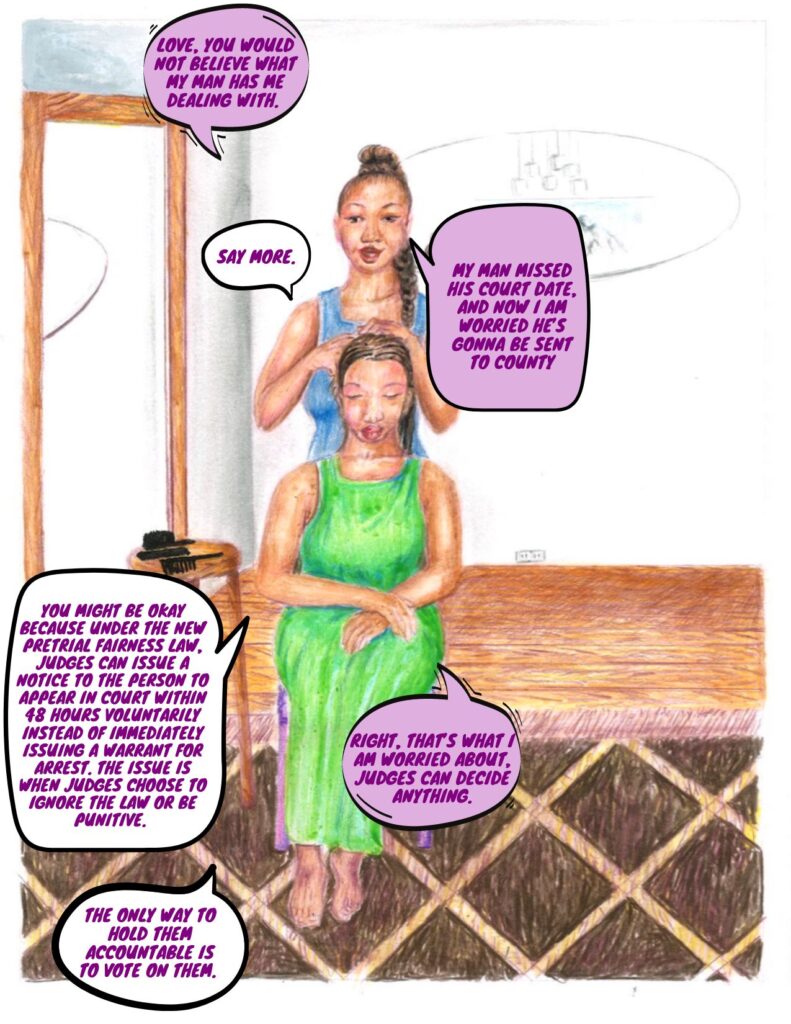

The State’s Attorney questionnaire was sent to all candidates. For candidates who completed the questionnaire, answers are based on direct responses. Direct quotes were pulled for candidates who did not complete the questionnaire.
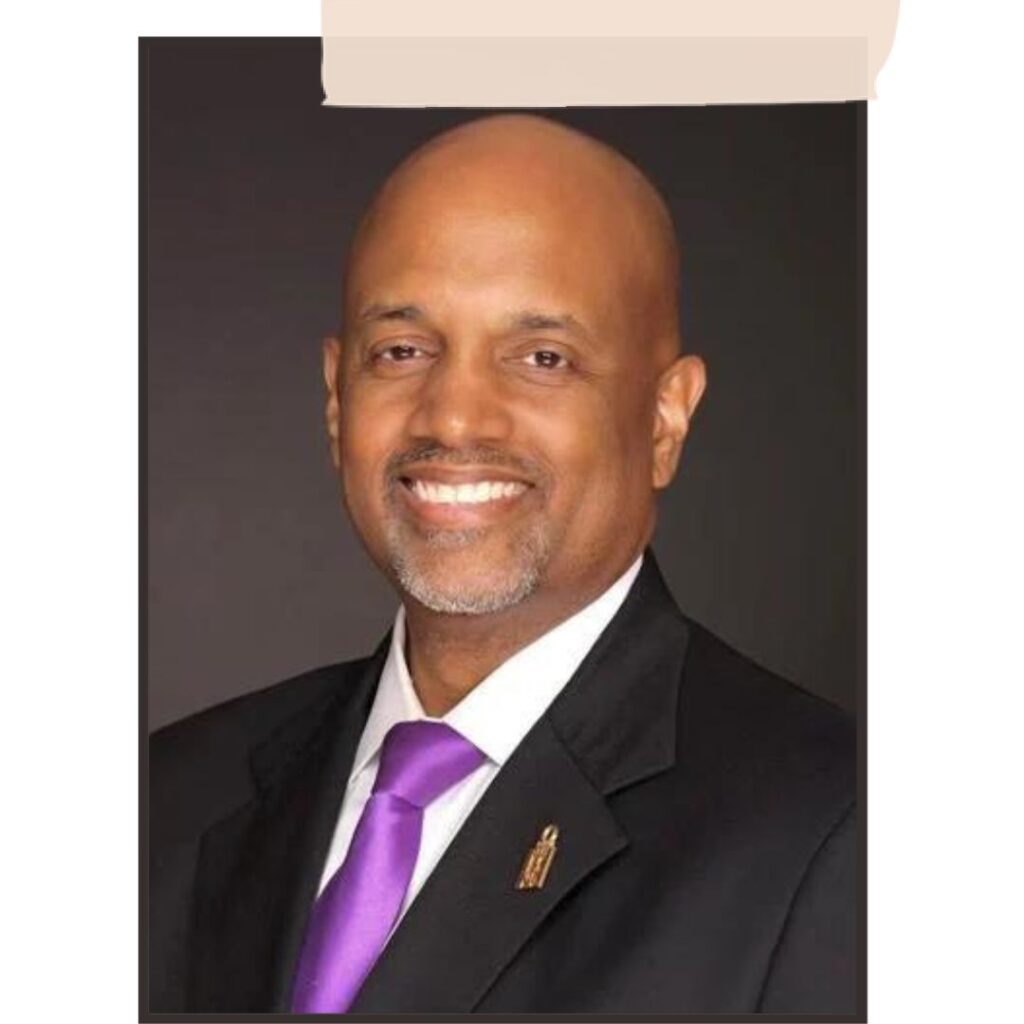
Clayton Harris III
Democrat

Eileen O’Neill
Burke
Democrat

Robert Fioretti
Republican
(Did not complete the questionnaire.)

Andrew Charles Kopinski
Libertarian
How will you use your discretion under the Pre-Trial Fairness Act to Request Detention?
The Pretrial Fairness Act, part of the larger SAFE-T Act, reforms pretrial procedures in Illinois. The law is designed to make the state’s pretrial practices more equitable, effective, and transparent. The act eliminates the use of money bonds as a condition of pretrial release and reforms pretrial hearing processes and detention procedures. All Pretrial Fairness Act reforms took effect statewide on September 18, 2023.

Clayton Harris III
“As State’s Attorney, I will request detention in accordance with the law when it comes to violent offenses and defendants accused of domestic violence.”

Eileen O’Neill Burke
“The Safety Act is a seminal, once in a generation, change to how we approach pre-trial detention. Prior to its enactment, pre-trial detention was determined by the setting of a monetary bond, the more serious the offense or the background of the offender, the higher the bond. Now, the criterion is whether the offender is a danger to the community or not. Most agree that this is where the criterion should be, wealth should not be a factor in pre-trial detention decisions. However, the SAFE-T Act also significantly changes the State’s Attorney’s role in determining who will be detained. Now, before a judge can consider whether or not to detain, the state must file a petition to detain. Without that petition being filed, the judge has no discretion to detain. Given the exponentially expanded power vested in the State’s Attorney, there is a heightened need for training, structure, and clear criteria for Assistant State Attorneys (ASAs) in bond court. With my experience, sound judgment, and commitment to fairness, I am well-equipped to exercise discretion responsibly under the Pre-trial Fairness Act, ensuring the safety of our communities and upholding fairness in the criminal justice system.”

Robert Fioretti
“The notion that violent criminals can be allowed to walk the streets in search of their next victim while awaiting trial for their previous violent crimes is aslap in the face of law-abiding citizens and the victims of their crimes. These violent criminals are literally laughing at those who passed this insane law.” (WTTW Voter Guide)

Andrew Charles Kopinski
“Detention would be requested for violent crimes and serious property crimes.”
Under the current Foxx Administration, retail thefts under $1000 are not prosecuted as a felony, but as a misdemeanor. Will your administration keep this same threshold or revert to the $300 threshold?

Clayton Harris III
“As State’s Attorney, I am going to take retail theft seriously and bring charges related to it that are appropriate to meet the crime–just like in every other case. We need accountability, and we need to send a clear message that retail theft won’t be tolerated in Cook County. We also are going to not limit our approach to retail theft charges–it’s important that we use every tool in the toolbox of state statute. That means bringing whatever charges are relevant–whether that be retail theft, burglary, or other charges if any related violence takes place. To be clear, under the current State’s Attorney, retail thefts are prosecuted as a felony at the $1000 threshold. Retail thefts under that threshold are prosecuted at other levels. I will maintain that approach to prosecution.”

Eileen O’Neill Burke
“I took an oath as a judge, and I will take the same oath as a State’s Attorney that I will uphold the law. The Felony Retail Theft statute has the value of goods at $300. If there is public sentiment to change the law, then the appropriate avenue to do so is to go to Springfield and change the law. That being said, that doesn’t mean that everyone charged with Retail Theft should go to jail. There are a wide variety of options available depending on the circumstances of the offense and the background of the offender. If someone has no background, they go to theft school and don’t get arrested again during a period of a few months, the offense is gone and does not impact their record. There is a gradation of penalties going from supervision, to probation to jail time. I can no more refuse to prosecute based on existing law than I would be able to refuse to prosecute someone who committed an act of terrorism against an abortion clinic or a corporation that polluted the environment.”

Robert Fioretti
“No, ABSOLUTELY NOT! Foxx’s ill-advised decision to ignore the law has been an unmitigated disaster for business owners, particularly in poor communities. It is literally impossible for mom-and-pop stores in African-American and Latino communities to keep their doors open if the State’s Attorney announces publicly that their merchandise is free game for shoplifters.” (WTTW Voter Guide)

Andrew Charles Kopinski
“My administration will revert to the lower threshold. Property crime is increasing at an alarming rate in Cook County, It is up to the state legislature to change the threshold.”
How will your office grow the investment of the Conviction Review Unit work?
The Conviction Review Unit (CRU) has a crucial role in examining assertions of actual innocence to assess if new evidence significantly raises the likelihood that the convicted defendant was not the true perpetrator of the offense they were found guilty of committing. The term “actual innocence” denotes complete absolution of any criminal responsibility on the part of the defendant for the said crime. The CRU’s primary responsibility is to investigate these claims and subsequently offer recommendations to the Cook County State’s Attorney regarding the appropriate course of action, if any, in light of its findings. However, it is important to note that the final decision on whether to grant a remedy to individuals seeking review by the CRU lies with the State’s Attorney. Learn more at cookcountystatesattorney.org.

Clayton Harris III
“I am committed to continuing and expanding the vital work of the Conviction Review Unit. Cook County residents deserve to know that their prosecutor has the judgment to lead in a just fashion, while also ensuring public safety. I am the only candidate in this race with the leadership experience and judgment to ensure this office keeps moving forward–not back. My opponent, Eileen O’Neill Burke, on the other hand, has a troubling track record of poor judgment that has put people in danger. Recent investigative reporting from WBEZ and the Chicago Tribune exposed that she was the lead prosecutor in the wrongful conviction of an 11-year-old Black boy for murder. The child was arrested illegally, and, according to the reporting, “his confession should have been thrown out because it resulted from coercion.” My opponent even “blasted a state law that limited the judge’s ability to lock up young offenders” during sentencing. Meanwhile, the true killer was never caught. The family of the victim never received justice, and that young man’s life was destroyed by the wrongful conviction. Even today, with the benefit of hindsight, my opponent has expressed no regret over her handling of that case. Voters should find this irresponsible and reckless lack of judgment gravely concerning.”

Eileen O’Neill Burke
“I am dedicated to the pursuit of justice as I have been my entire career. If our community does not trust that our office is upholding justice, then they won’t work with us to keep people safe. I will maintain a conviction integrity unit that works closely with our training curriculum to ensure that all cases going forward and cases that were under our jurisdiction in the past are held to the highest standards in the country. Conviction Integrity, Post-Conviction, and Appeals should be placed together in one division so that they can combine efforts, resources, and personnel in the most efficient and effective way.”

Robert Fioretti
“Justice should be blind, impartial and free of politics. This is a mission-driven person now leading the Conviction Review Unit. No one wants to put innocent people in prison, but the best way to stop that from happening is to do a thorough job as a prosecutor. State’s Attorneys have tremendous discretion in the cases they prosecute. Instead of second-guessing prosecutions, we need to do the job right the first time. Kim Foxx has turned the State’s Attorney office into another government-backed defense attorney agency. She is actively working against the attorneys in her own office by placing an activist in charge of this review panel. There is no objectivity here. My message to the hard-working men and women in the Cook County State’s Attorney office who are working to protect our residents – help is on the way.
I have a proven track record of fighting for justice.I will be the tough but fair prosecutor we need. The solution to preventing innocent people from going to jail is to do a thorough and effective job as the County’s prosecutor. The solution is to support, not undermine the mission, which is to protect the people of Cook County. The cycle must be broken, and the rule of law must be reestablished at all levels of our society. Enough is enough.” (The Southland Journal)

Andrew Charles Kopinski
“We will continue the work of this unit. The goal has to be “justice.”’ Convicting innocent people of crimes they did not commit is a wrong that cannot be allowed to stand.”
A study that analyzed more than 4.6 million traffic stops over 19 years in Chicago, found Black drivers were 6x more likely to be stopped by police in Chicago. How will your office effectively reduce gun violence without simply relying on racially targeted traffic stops?

Clayton Harris III
“As State’s Attorney, I’ll rethink how our office handles cases stemming from pretextual stops–or stops in which police officers use a low-level violation to justify a larger search on a person or vehicle. Pretextual stops impact people of color disproportionately, and that damages the trust with communities. CPD finds guns in fewer than 1 percent of stops. The bottom line is that we want to make sure traffic stops are being used to keep people safe, and not to harass or discriminate against people of color.
Gun crimes are the most charged and most prosecuted felonies in the state’s attorney right now. I live in a neighborhood where we hear gunshots on our blocks. We have to get guns out of the hands of people who would do us harm. When I’m State’s Attorney, we’ll expand the effort to embed prosecutors with CPD in the top 5 communities hardest hit by gun violence. I’ll make sure the people using guns are detained and aggressively prosecuted. And we’ll work with law enforcement partners to stop the flow of guns into our communities from states like Florida, Indiana, Tennessee and Kentucky.”

Eileen O’Neill Burke
“On all matters, decisions will be transparent and consistent, with one set of rules for everyone, including police. As State’s Attorney, I want to transform our criminal justice system so that when someone commits a crime with a gun, they will be prosecuted by the best-trained felony prosecution division in the country. By working with federal offices and our neighboring states, we will tackle the flow of illegal guns, we will go after straw purchasers who sell those guns to criminals. Recognizing the rise in gun possession with auto switches and extended magazines, especially amid mass shootings, we will leverage Illinois’ Assault Weapons ban to send a clear message that such weapons will not be tolerated. This involves seeking detention and advocating for maximum penalties for individuals found in possession of these weapons with these enhancements. Rather than relying on racially targeted traffic stops, my focus is on strategic collaboration, effective prosecution, and a comprehensive approach to addressing the root causes of gun violence in our community.”

Robert Fioretti
“The State’s Attorney has a duty to make sure every resident of Cook County is treated equally under the law, regardless of race, religion, what zip code they are from, or who they love. It is how I conducted myself as Alderman in the City Council and it is how I will conduct myself as State’s Attorney… There will be no racial disparities in my Administration. Everyone will be treated equally under the law.” (ACLU Illinois)

Andrew Charles Kopinski
“Gun violence can be reduced by effectively prosecuting gun related criminal offenses.”
What is the State’s Attorney’s role in addressing the root causes of violence, and preventing harm before it happens?

Clayton Harris III
“This election is about ensuring justice throughout Cook County and continuing the progress on the road to reform of our criminal legal system. It’s also about ensuring that residents across Cook County feel safe and we help to address the root causes of crime. What’s at stake is continuing the progress we’ve made or going backward toward a system that unfairly targets minority populations and focuses on punishment alone rather than addressing the root causes of crime.
As a Black man and former Assistant State’s Attorney, I saw firsthand how the criminal justice system in Cook County targeted Black and Brown communities and led to their over-incarceration and over-policing. I believe that my background also provides me with a unique perspective that can ensure the Cook County State’s Attorney is treating everyone fairly with equal accountability, regardless of race or gender.
The sphere of influence of the Cook County State’s Attorney is much larger than its prosecutorial power. We must focus on prosecutorial deflection rather than simply diversion programs that happen post-arrest. These deflection programs would work to help people avoid contact with the criminal justice system in the first place. Like police, prosecutors need to be a part of our communities if we’re going to build trust in the criminal legal system among residents. I will work with the Chief Judge of Cook County to expand community courts, ensuring that prosecutors are interacting with residents on the ground in their own neighborhoods and holding people accountable in a way that’s visible and tangible for victims and other impacted residents. I will ensure the State’s Attorney’s Office is working with community organizations, victims’ advocacy groups, business community leaders, and other stakeholders to share information and infuse more resources into efforts to interrupt community violence.
I hope to continue and expand the work the current State’s Attorney’s office is doing with Community Justice Centers, which hosted over 900 events in 2022 to showcase to communities across Cook County that prosecutors are working to keep people safe, and they should feel safe reporting crimes or get connected to resources to avoid the criminal justice system altogether.”

Eileen O’Neill Burke
“Public safety affects everyone, communities with less wealth and status face additional hurdles in having the appropriate amount of resources dedicated to their protection and to addressing waves of crime targeting them. I want to reshape the office so that it is recruiting lawyers from all over the country to work in an innovative office that tackles violent crime and works to combat the root causes of crime like poverty and historic disinvestment in communities through a newly fashioned restorative justice bureau. To reduce recidivism for both adults and juveniles, we must take a thoughtful approach to restorative justice in juvenile, veterans, drug, and mental health courts, where many repeat offenders come from. By combining these courts, attorneys in our office will interact with government agencies to find solutions that work for getting people on track. While getting low-level crime handled through treatment and root cause-focused programming must be a priority, we also have to go after violent crime. By doing this two-fold approach we will have a direct benefit to communities that experience the vast majority of crime.”

Robert Fioretti
“From day one, Kim Foxx has coddled violent criminals as if they were all Jussie Smollett. That will end on day one of my Administration. I will reverse Foxx’s disastrous policy of ignoring shoplifting, which has literally driven numerous Cook County businesses to close their doors forever. I will treat the possession of illegal guns as the serious crime that it is. If we are serious about getting guns off the street, we MUST get those that possess and brandish them off the street.” (WTTW Voter Guide)

Andrew Charles Kopinski
“The state’s attorney’s office can recommend and promote policies that address the root causes of violence and help prevent harm before it happens Programs that promote economic opportunity and positive youth oriented programs should be among them.”

At the end of your ballot, you will be faced with a list of almost 70 candidates running to fill 45 vacancies on the circuit, appellate, and supreme courts. Don’t skip this part!
Of all the people on your ballot, judges are the folks you are most likely to encounter. They have a ton of power over people’s lives, deciding the outcomes of child custody, traffic tickets, and whether or not someone will be sent to prison and for how long. Every 6 years, voters get to decide if a Circuit Court judge keeps their job for another term. Appellate Court and State Supreme Court judges serve 10-year terms.
- Whoever gets the most votes wins.
- Listed are names that were not flagged as having past controversies in black. Please note these are not endorsements.
- Listed are names flagged by Injustice Watch as having a past controversy in red. Chicago Votes encourages voters to find more information at injusticewatch.org.
Supreme Court Vacancies
BURKE VACANCY • DEMOCRATIC PARTY
Joy Virginia Cunningham
Jesse G. Reyes
Appellate Court Vacancies
CONNORS VACANCY • DEMOCRATIC PARTY
Mary Lane Mikva
CUNNINGHAM VACANCY • DEMOCRATIC PARTY
Cynthia Y. Cobbs
Carolyn J. Gallagher
DELORT VACANCY • DEMOCRATIC PARTY
Celia Louise Gamrath
Leonard Murray
O’NEILL BURKE VACANCY • DEMOCRATIC PARTY
Carl Anthony Walker
Circuit Court Vacancies
FLANNERY, JR. VACANCY • DEMOCRATIC PARTY
Pablo F. deCastro
Chelsey Renece Robinson
GAUGHAN VACANCY • DEMOCRATIC PARTY
Corinne C. Heggie
HABERKORN VACANCY • DEMOCRATIC PARTY
Sarah Johnson
HUBBARD VACANCY • DEMOCRATIC PARTY
Deidre M. Dyer
MITCHELL VACANCY • DEMOCRATIC PARTY
Neil Cohen
Wende William
MARAS VACANCY • DEMOCRATIC PARTY
Arlene Y. Coleman-Romeo
MURPHY VACANCY • DEMOCRATIC PARTY
Lori Ann Roper
Edward Joseph Underhill
PROPES VACANCY • DEMOCRATIC PARTY
Debjani ‘Deb’ Desai
Russ Hartigan
SULLIVAN VACANCY • DEMOCRATIC PARTY
James S. Murphy-Aguilú
RAINES VACANCY • DEMOCRATIC PARTY
Jennifer Patricia Callahan
WALKER VACANCY • DEMOCRATIC PARTY
Chloé Georgianna Pedersen
Circuit Court Vacancies (Subcircuits)
3RD SUBCIRCUIT • BROSNAHAN VACANCY • DEMOCRATIC PARTY
Lucy Vazquez-Gonzalez
Martin Douglas Reggi
3RD SUBCIRCUIT • HARMENING VACANCY • DEMOCRATIC PARTY
Pat Heery
4TH SUBCIRCUIT • FELICE VACANCY • DEMOCRATIC PARTY
Michael M. Chvatal
4TH SUBCIRCUIT • KING VACANCY • DEMOCRATIC PARTY
Philip Fowler
4TH SUBCIRCUIT • MALONEY VACANCY • DEMOCRATIC PARTY
Koula A. Fournier
5TH SUBCIRCUIT • LEWIS VACANCY • DEMOCRATIC PARTY
Yolanda Harris Sayre
7TH SUBCIRCUIT • SOLGANIK VACANCY •
DEMOCRATIC PARTY
Deidre Baumann
Owens J. Shelby
8TH SUBCIRCUIT • COLLINS-DOLE VACANCY • DEMOCRATIC PARTY
Loveleen Ahuja
10TH SUBCIRCUIT • MCWILLIAMS VACANCY • DEMOCRATIC PARTY
Caroline Glennon-Goodman
10TH SUBCIRCUIT • WOJKOWSKI VACANCY • DEMOCRATIC PARTY
Liam Kelly
James V. Murphy
11TH SUBCIRCUIT • COLLINS VACANCY • DEMOCRATIC PARTY
Dawn Gonzalez
11TH SUBCIRCUIT • DALEO VACANCY • DEMOCRATIC PARTY
Audrey Victoria Cosgrove
Kim Przekota
12TH SUBCIRCUIT • DICKLER VACANCY •
DEMOCRATIC PARTY: Alon Stein
REPUBLICAN PARTY: Maria McCarthy
12TH SUBCIRCUIT • QUINN VACANCY •
DEMOCRATIC PARTY: Frank J. Andreou
REPUBLICAN PARTY: Pamela Curran Smith
12TH SUBCIRCUIT • SCHLEIFER VACANCY •
DEMOCRATIC PARTY: James “Jack” Costello
REPUBLICAN PARTY: Matthew Taylor
Circuit Court Vacancies (Subcircuit Continued)
13TH SUBCIRCUIT • BETAR, III VACANCY • DEMOCRATIC PARTY
Ralph E. Meczyk
13TH SUBCIRCUIT • STEFFEN VACANCY • DEMOCRATIC PARTY
Mary Sevandal Cohen
14TH SUBCIRCUIT • O’HARA VACANCY • DEMOCRATIC PARTY
Griselda Vega Samuel
Steve Demitro
14TH SUBCIRCUIT • PIERCE VACANCY • DEMOCRATIC PARTY
Stephanie Kathryn Miller
15TH SUBCIRCUIT • DEMACOPOULOS VACANCY • DEMOCRATIC PARTY
Paul A. O’Grady
Allen Price Walker
Luciano “Lou” Panici, Jr.
15TH SUBCIRCUIT • TOOMIN VACANCY • DEMOCRATIC PARTY
John A. Fairman
16TH SUBCIRCUIT • FLOOD VACANCY • DEMOCRATIC PARTY
Pedro Fregoso, Jr.
16TH SUBCIRCUIT • GRIFFIN, JR. VACANCY • DEMOCRATIC PARTY
Cecilia Abundis
17TH SUBCIRCUIT • AGUILAR VACANCY • DEMOCRATIC PARTY
Rivanda Doss Beal
17TH SUBCIRCUIT • FLAHERTY VACANCY • DEMOCRATIC PARTY
Lloyd James Brooks
18TH SUBCIRCUIT • EDIDIN VACANCY • DEMOCRATIC PARTY
Jeffery G. Chrones
Sunil Bhave
18TH SUBCIRCUIT • LINN VACANCY •
DEMOCRATIC PARTY: John Hock
REPUBLICAN PARTY: Lynn Terese Palac
19TH SUBCIRCUIT • SENECHALLE, JR. VACANCY • DEMOCRATIC PARTY
Bridget Colleen Duignan
Risa Renee Lanier
Dave Heilmann
20TH SUBCIRCUIT • BUDZINSKI VACANCY • DEMOCRATIC PARTY
Nickolas Pappas
Michael J. Zink
John Poulos
Nadine Jean Wichern
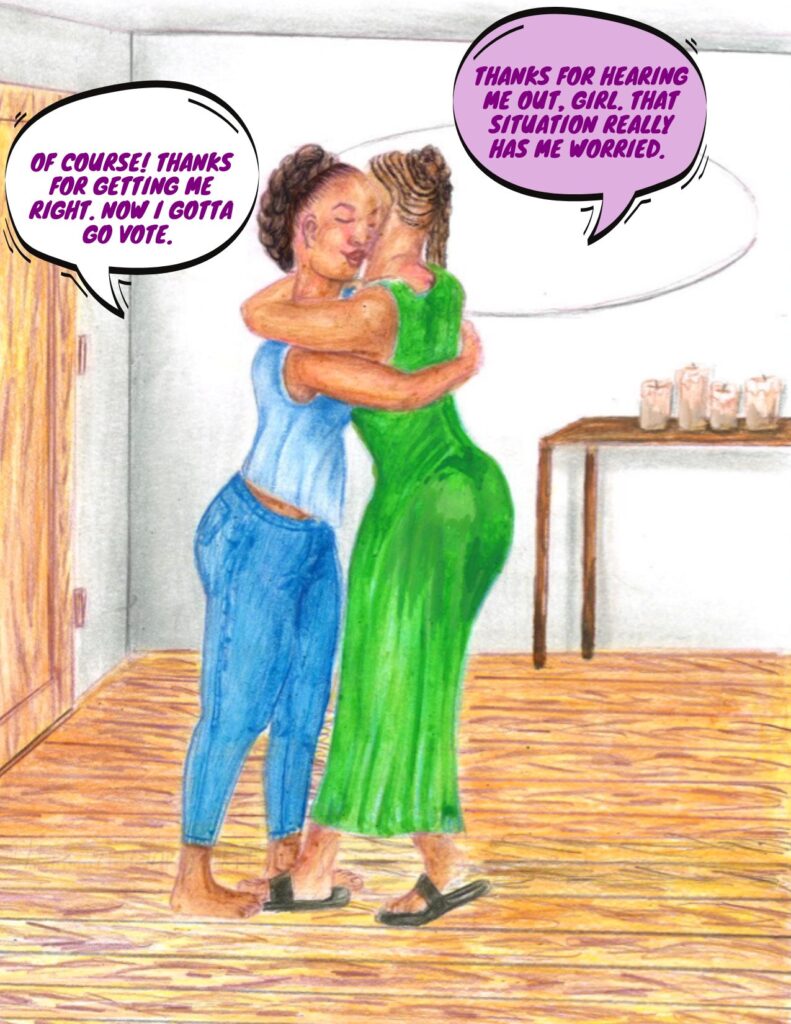
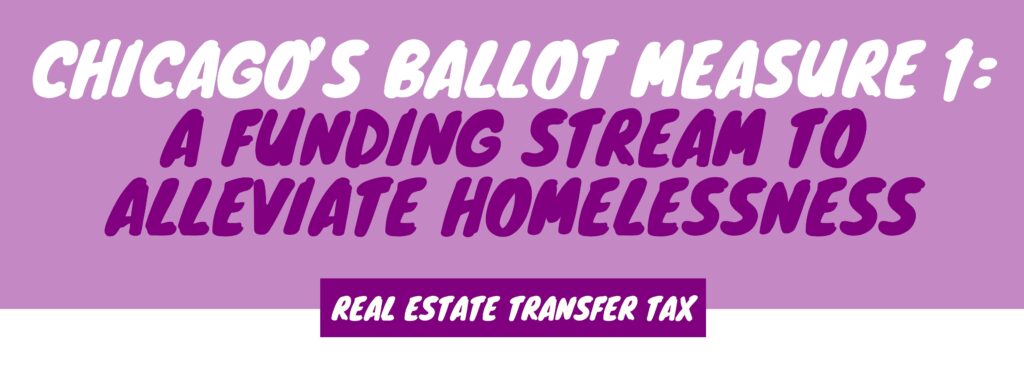


The Real Estate Transfer Tax is a one-time tax on properties at the point of sale, paid by the buyer. Right now, all properties are taxed at the same rate, regardless of property value. Under the proposal, the transfer tax rate for properties sold at $1 million or more would be increased. The funds collected from this tax would go towards permanent housing and services to alleviate homelessness. Properties sold for less than $1 million would see a decrease in Real Estate Transfer Tax.


Shall the City of Chicago impose:
1. a real estate transfer tax decrease of 20% to establish a new transfer tax rate of $3 for every $500 of the transfer price, or fraction thereof, for that part of the transfer price under $1,000,000 to be paid by the buyer of the real estate transferred unless the buyer is exempt from the tax solely by operation of state law, in which case the tax is to be paid by the seller; AND
2. a real estate transfer tax increase of 166.67% to establish a new transfer tax rate of $10 for every $500 of the transfer price or fraction thereof, for that part of the transfer price between $1,000,000 and $1,500,000 (inclusive) to be paid by the buyer of the real estate transferred unless the buyer is exempt from the tax solely by operation of state law, in which case the tax is to be paid by the seller; AND
3. a real estate transfer tax increase of 300% to establish a new transfer tax rate of $15 for every $500 of the transfer price, or fraction thereof, for that part of the transfer price exceeding $1,500,000 to be paid by the buyer of the real estate transferred unless the buyer is exempt from the tax solely by operation of state law, in which case the tax is to be paid by the seller?
The current rate of the real estate transfer tax is $3.75 per $500 of the entire transfer price, or fraction thereof, and the revenue is used for general corporate purposes. The revenue from the increase (the difference between revenue generated under the increased rate and the current rate) is to be used for the purpose of addressing homelessness, including providing permanent affordable housing and the services necessary to obtain and maintain permanent housing in the City of Chicago.
□ Yes
□ No
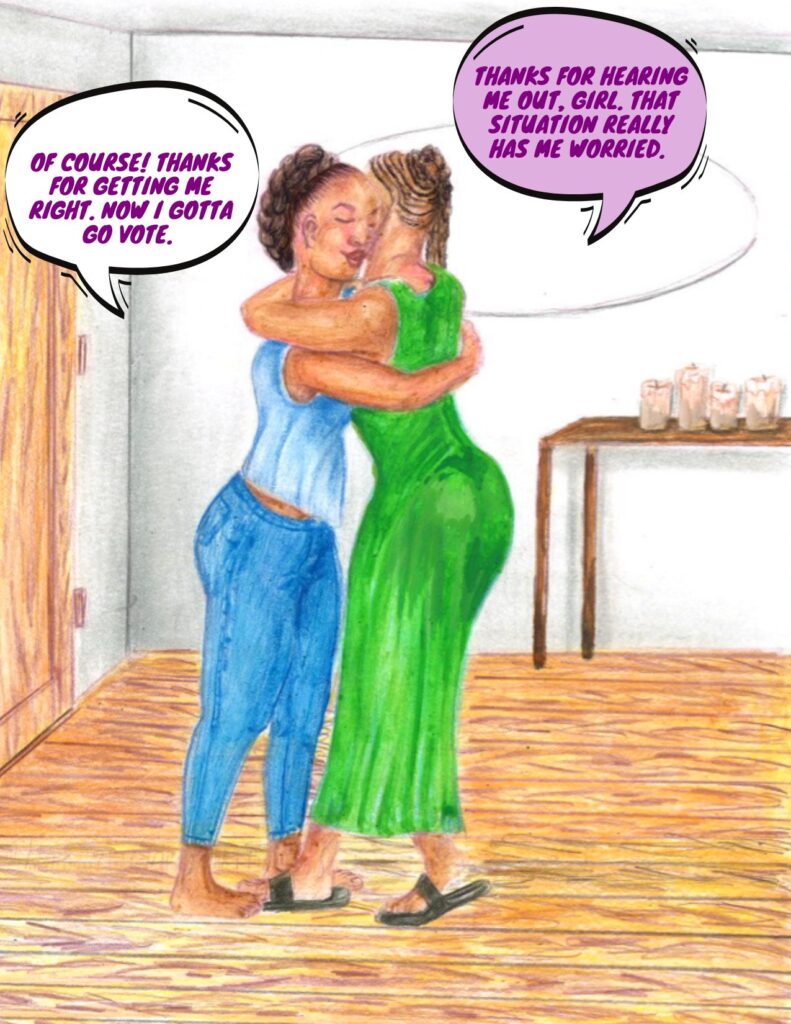

February 15, 2024
Early voting is available at the Loop Supersite (191 N. Clark) and the Chicago Board of Elections Office (69 W. Washington, 6th Floor) beginning February 15th.
March 4, 2024
First day for Early Voting in all 50 Wards in Chicago.
March 14, 2024
If you want to vote by mail, you must request your ballot by 5pm.
March 19, 2024
Election Day! If you are returning a vote-by-mail ballot via mail, your ballot must be postmarked on or before Election Day.

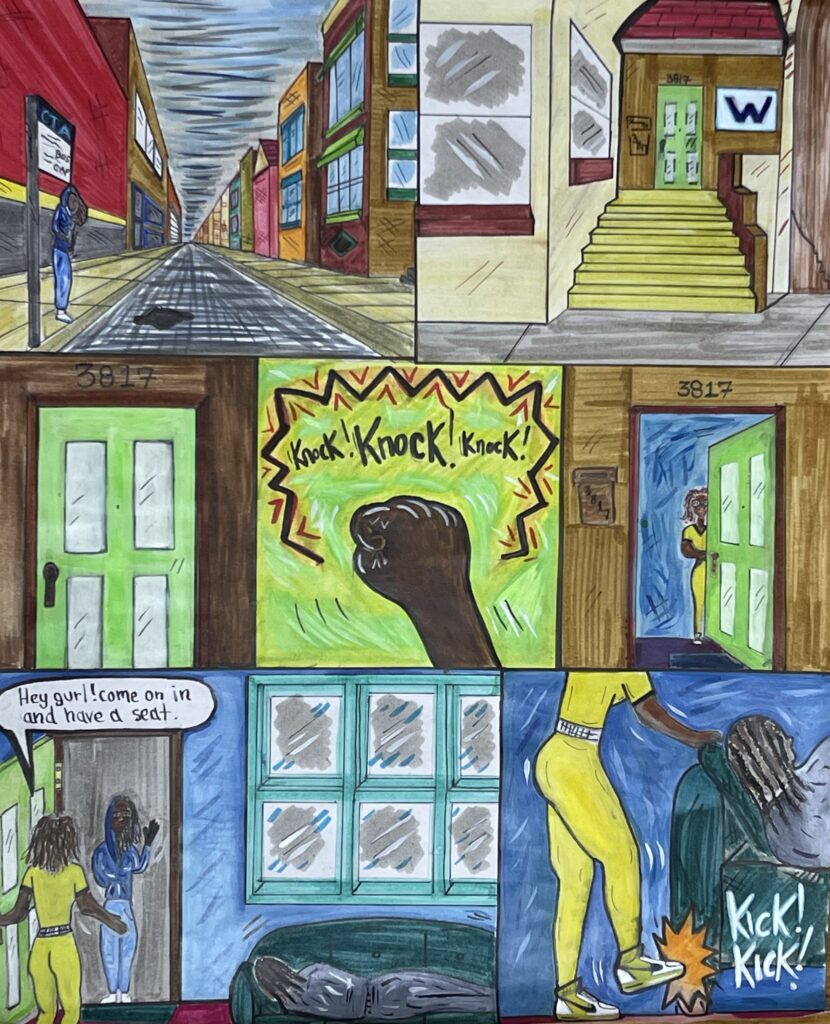
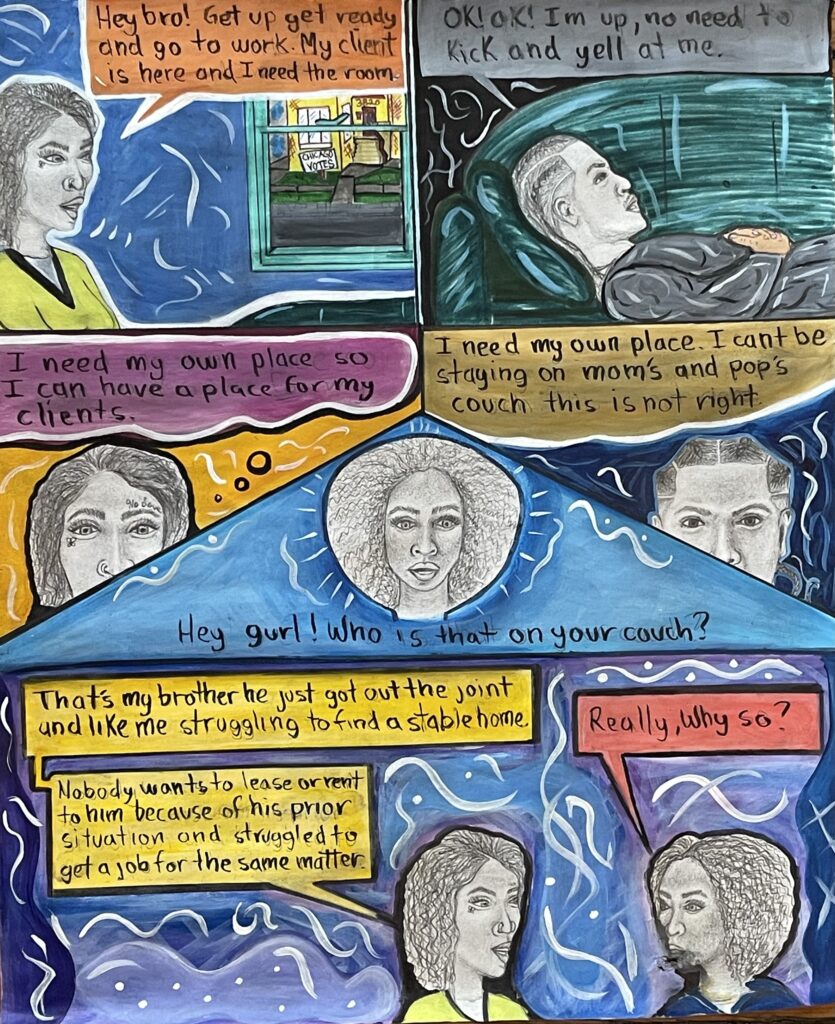
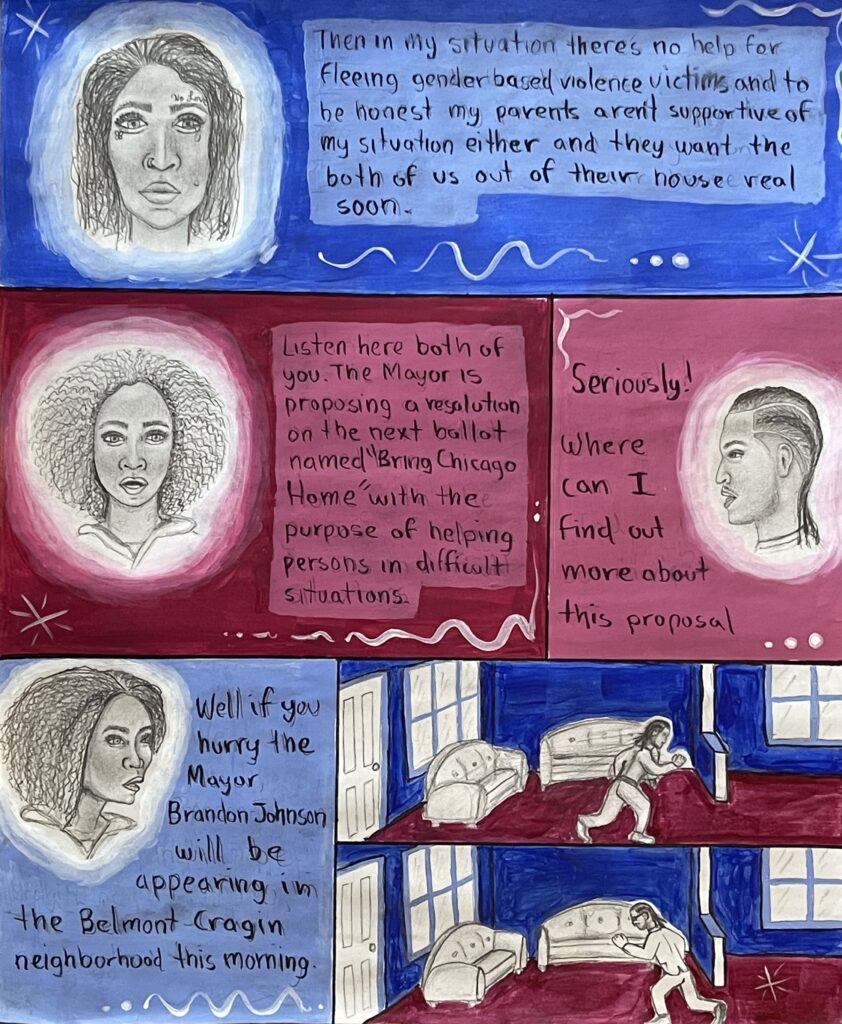
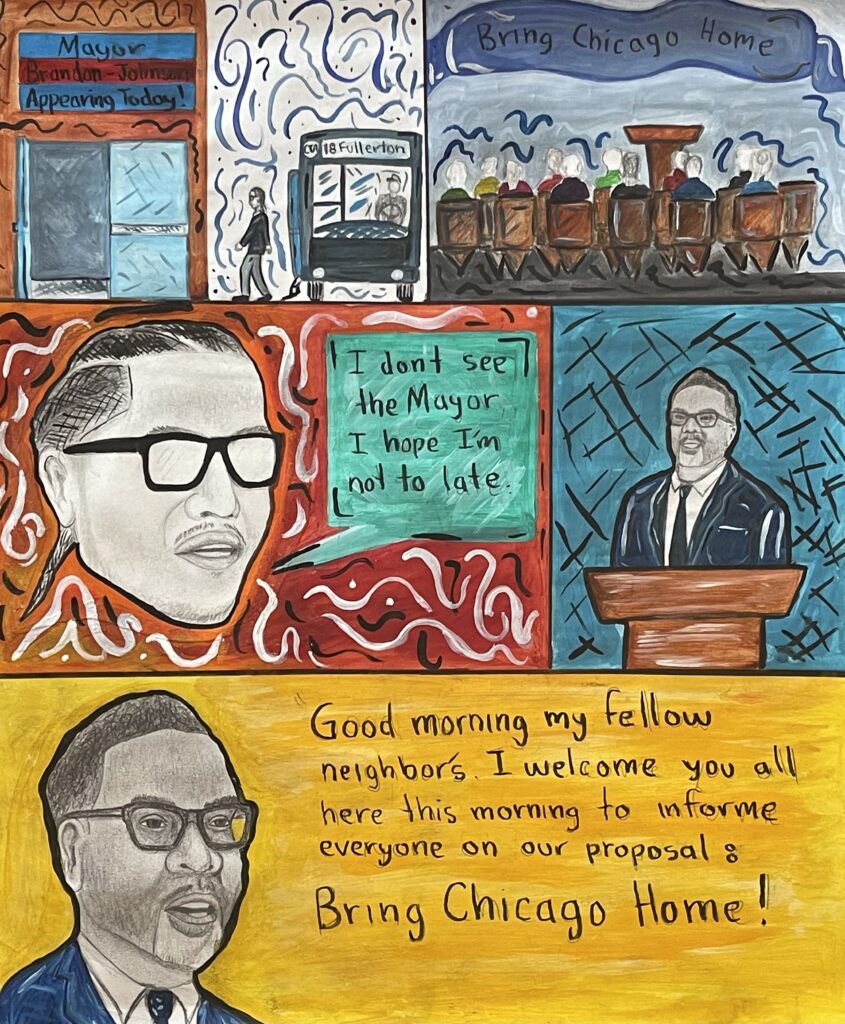
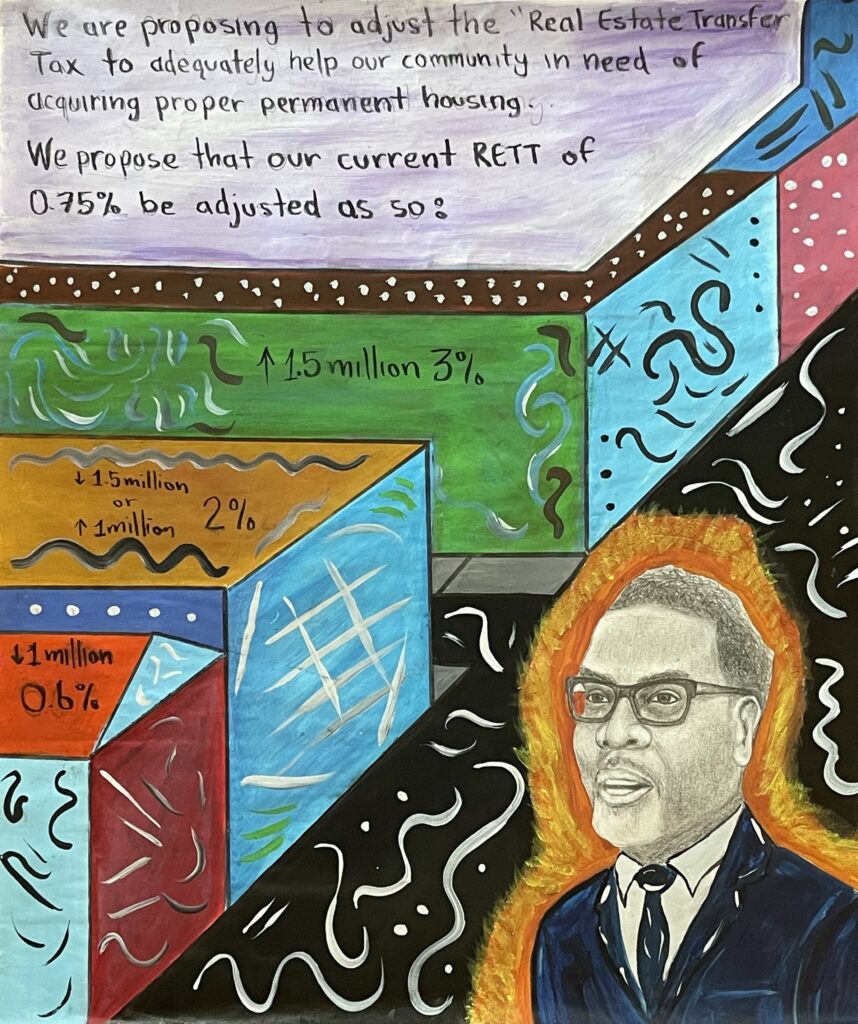
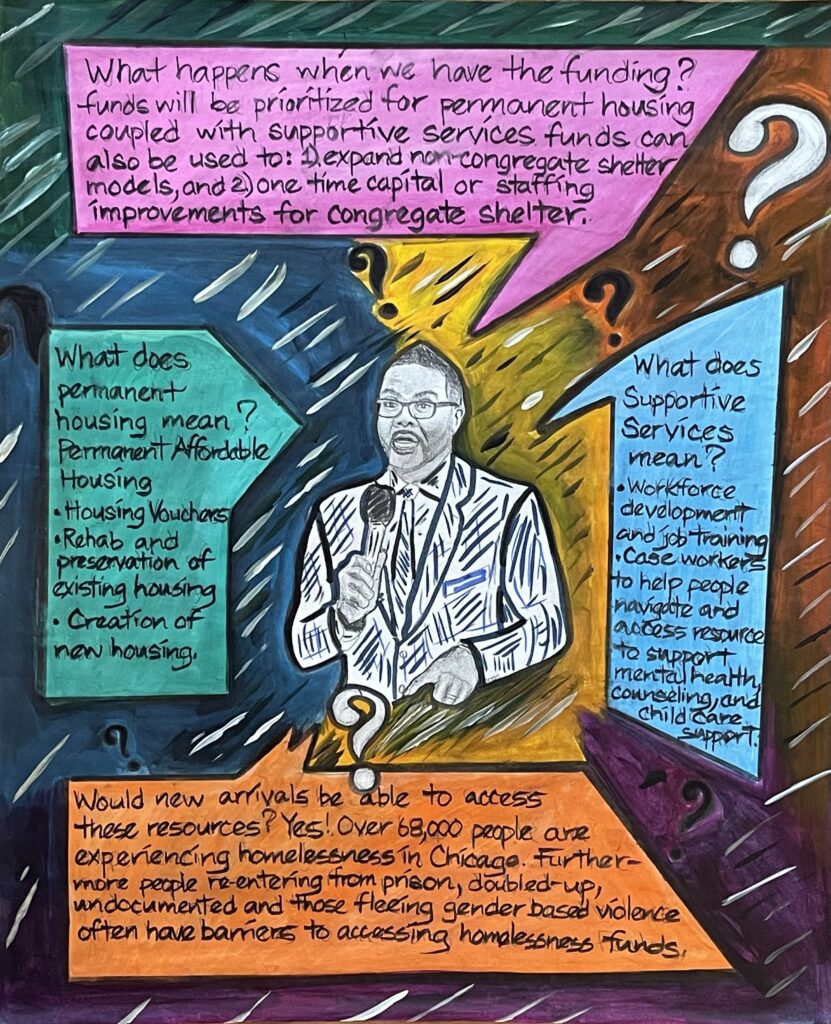
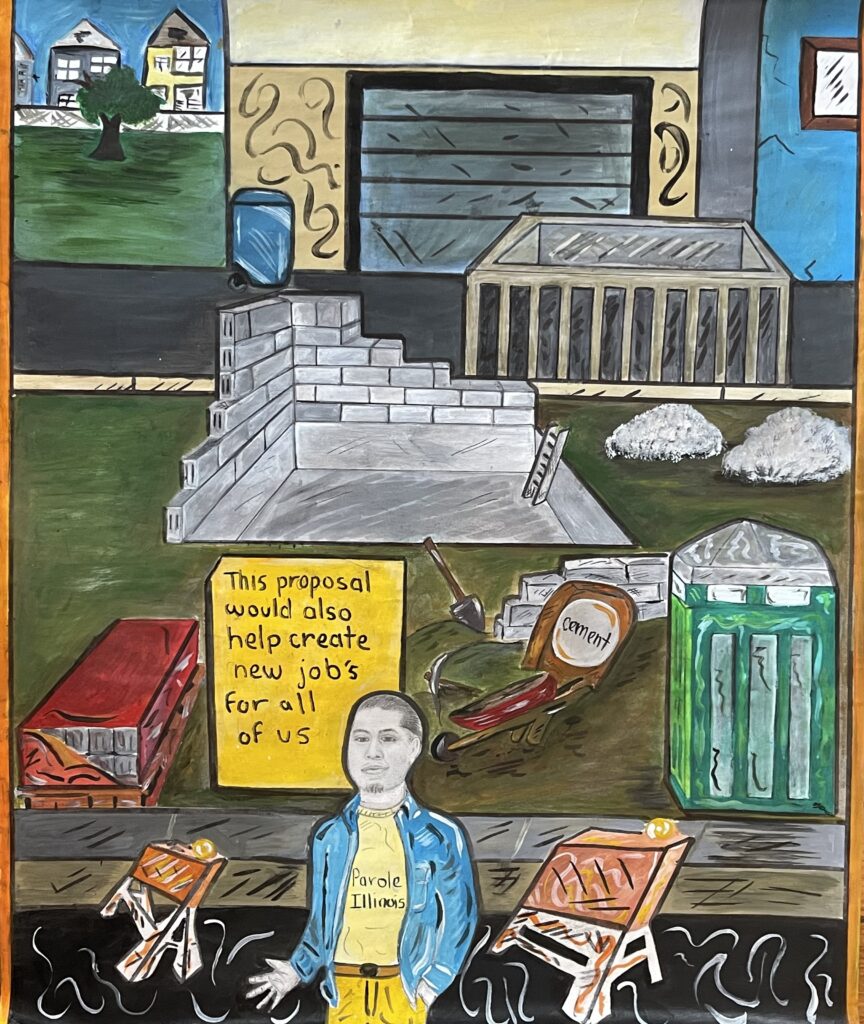
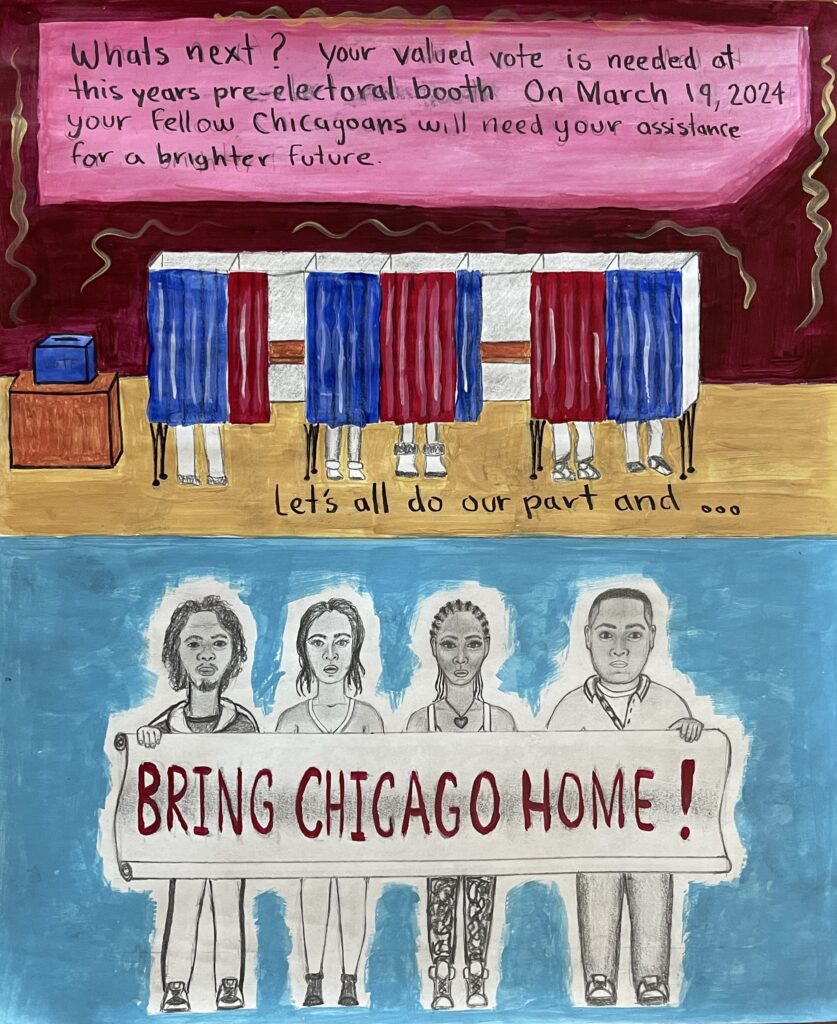
Get your election questions answered.
What are my voting rights?
- On Election Day, each polling place will be open from 6am to 7pm. Voters in line at the polling place by 7pm must be allowed to vote.
- Voters have the right to vote (and wait to vote) without anyone intimidating them. This includes campaigning and electioneering.
- All registered voters may request a mail-in ballot. The deadline to request a ballot is March 14, 2024.
- In general, voters do not have to provide ID at the polling place. There are three exceptions: a voter using Election Day Registration, a voter changing their voting address at the polling place, or a first-time voter who registered by mail but did not submit proof of identity with the registration application
- Election Day, or Same Day, Registration is available at all early voting sites and on Election Day. Voters must bring two forms of ID, with at least one that includes your current address.
- Voters who need assistance voting are entitled to have a person of their choice, except for the voter’s employer or union representative, provide bilingual assistance or assist the voter in marking their choices on the ballot.
- If you have completed your sentence, you can vote. Only people currently serving a sentence in the Illinois Department of Corrections cannot vote.
- You may bring written or printed materials into the voting booth to assist you.
If you have trouble at the polls, call Election Protection at 866-OUR-VOTE.
Can I vote with a felony record?
If you have a felony and have completed your sentence, you can vote. Only people currently serving a sentence in the Illinois Department of Corrections cannot vote. This includes people on temporary leave/furlough from jail/prison.
When can I vote?
Beginning February 15th, anyone can vote at the Chicago Board of Elections Supersite at 191 N. Clark. You can also vote in person from March 4th through March 19th at any of the 50 early voting locations in Chicago. You can catch up on all things early voting at chicagoelections.gov.
Can I vote by mail?
All Illinois voters have the option to vote by mail, receiving a ballot in the mail and either mailing it back or bringing it to a ballot dropbox.
The deadline to apply to Vote By Mail is 5:00 pm on March 14, 2024. You can apply to vote by mail on the Chicago Board of Elections website. Once you receive your ballot, fill it out and then mail it in, or put it in an official drop- box.
How can I support elections?
Election Day is March 19th, and election judges and coordinators are the keys to making polling places run smoothly. Election judges can earn anywhere from $170 to $255.
Ready to commit? Apply right here.
What am I going to be voting on?
Chicago voters will be casting ballots on the following offices:
To Be Nominated:
- U.S. President
- U.S. Representative
- Illinois State Senator
- Illinois State Representative
- Water Reclamation District Commissioner
- Cook County Clerk of the Circuit Court
- Cook County State’s Attorney
- Cook County Commissioner
- Board of Review Commissioner
- Illinois Supreme Court Judge
- Illinois Appellate Court Judge
- Circuit Court Judge
- Subcircuit Judge
To Be Elected:
- Ward Committeeperson
- Delegates and Alternate Delegates to National Nominating Convention
Who is Chicago Votes?
Chicago Votes is a non-partisan, non-profit organization building a more inclusive democracy by putting power in the hands of young Chicagoans. We’re engaging a new generation of leaders, changing laws to make Chicago and Illinois a better place to be young, and in the process, we’re making democracy FUN.









